Abuja, Federal Capital Territory, Nigeria: ChichiChic Top 10 Highlights
Abuja is the capital city of Nigeria located in the centre of the country within the Federal Capital Territory (FCT). It is a planned city and was built mainly in the 1980s, replacing the country’s most populous city, Lagos, as the capital on December 12th, 1991. According to Wikipedia, Abuja grew by 139.7% between 2000 and 2010, making it the fastest growing city in the world. As of 2015, the city was still experiencing an annual growth of at least 35%, still retaining its position as the fastest-growing city on the African continent and one of the fastest-growing in the world.
Abuja experiences three weather conditions annually: warm, humid rainy season (April to October–daytime temperatures reach 28 °C (82.4 °F) to 30 °C (86.0 °F)) and a blistering dry season (daytime temperatures can soar as high as 40 °C (104.0 °F) and nighttime temperatures can dip to 12 °C (53.6 °F)). In between the two, there is a brief interlude of harmattan (mostly in December)–mainly featuring dust haze and dryness.
This was my third trip to Abuja. For this trip, the main purpose was to attend the World Federation of Societies of Anesthesia’s (WFSA) 6th All Africa Congress–a meeting of Anesthesiologists and Critical Care Doctors from all over the world (but mostly Africa). I was invited to give two talks on Pediatric Critical Care in Sub-Saharan Africa. I was also able to catch up with friends and loved ones during this trip.
So here they are the top 10 highlights of my trip to Abuja, Nigeria.
1. The WFSA All Africa Congress: It was so refreshing to see the investment of many brilliant minds (both from Africa and other parts of the world) in Sub-Saharan Africa. The average life expectancy in Nigeria is 53 years as of 2016 (as compared to 81 years in the US)–Nigeria is even better off compared to many other Sub-Saharan nations. I am motivated more than ever to create and invest in programs that will help address health matters that impact the lives of so many who have so little.

2. Aso Rock: Aso Rock is a 1300 ft tall monolith that is the most noticeable feature of Abuja. The Nigerian Presidential Complex, Nigerian National Assembly, and Nigerian Supreme Court are located around it. According to Wikipedia, “Aso” means victorious in the native language of the (now displaced) Asokoro(“the people of victory”). Aso Rock is just such an awe-inspiring sight to behold.
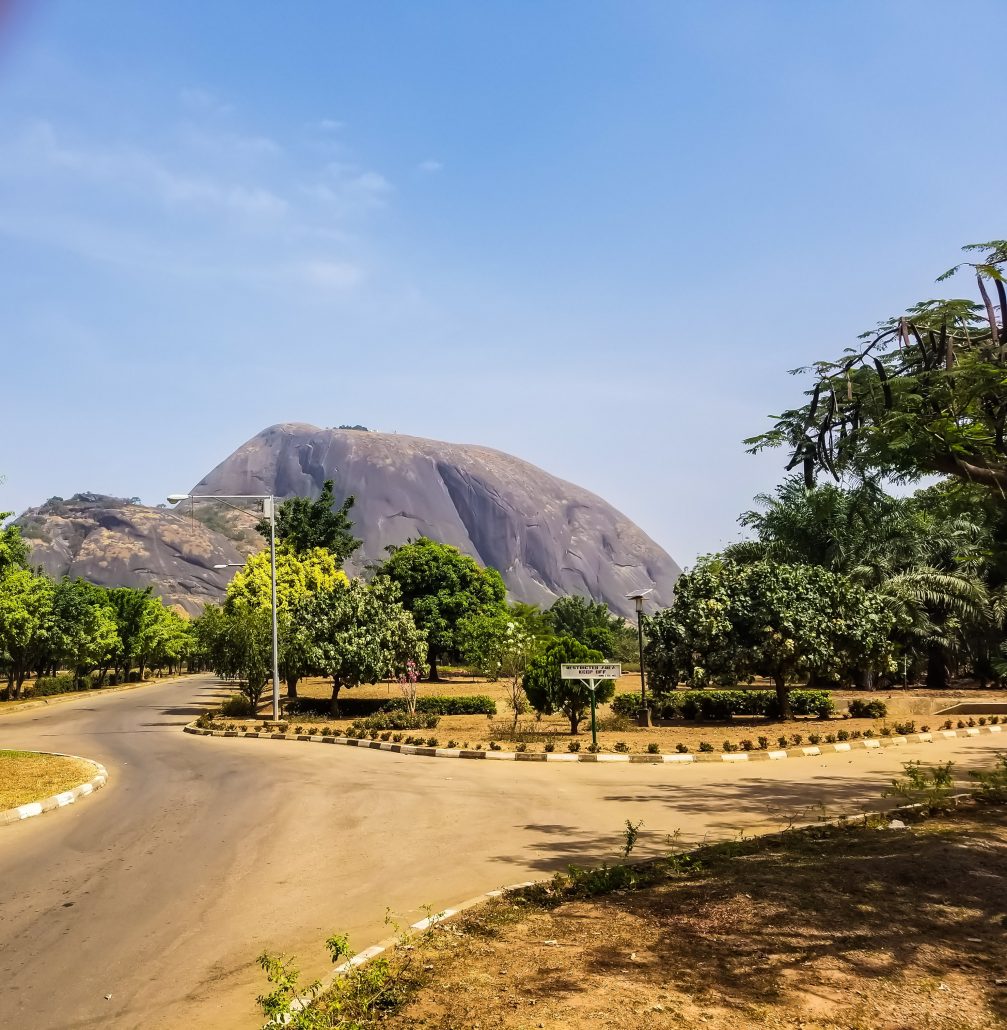
Aso Rock
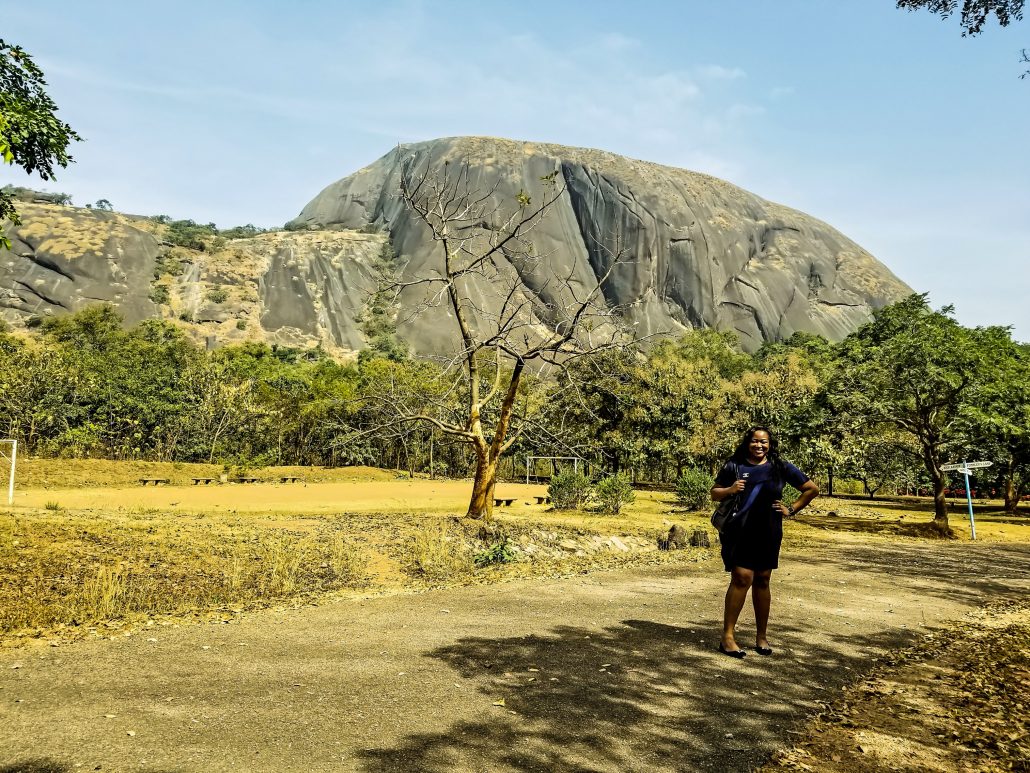
At the base of Aso Rock in the Abuja Children’s Park and Zoo
3. Millenium Park: The Millennium Park is the largest public park of Abuja and is located in the Maitama district of the city. The Millennium Park was inaugurated by Her Majesty Queen Elizabeth II of the United Kingdom on December 4th, 2003. It is located near to the former Presidential Palace close to the nucleus of presidential and administrative buildings of the city. According to Wikipedia, during the Millennium Park opening ceremony, each Commonwealth Head of State has planted symbolically a Traveller’s Palm giving birth to the Park. Operated by Construction Giant, Salini Nigeria Ltd, Millenium Park is an oasis in the middle of a busy city–it is picturesque and the perfect spot for relaxing, picnicking and nature watching.

Millenium Park Abuja: Aso Rock in the background
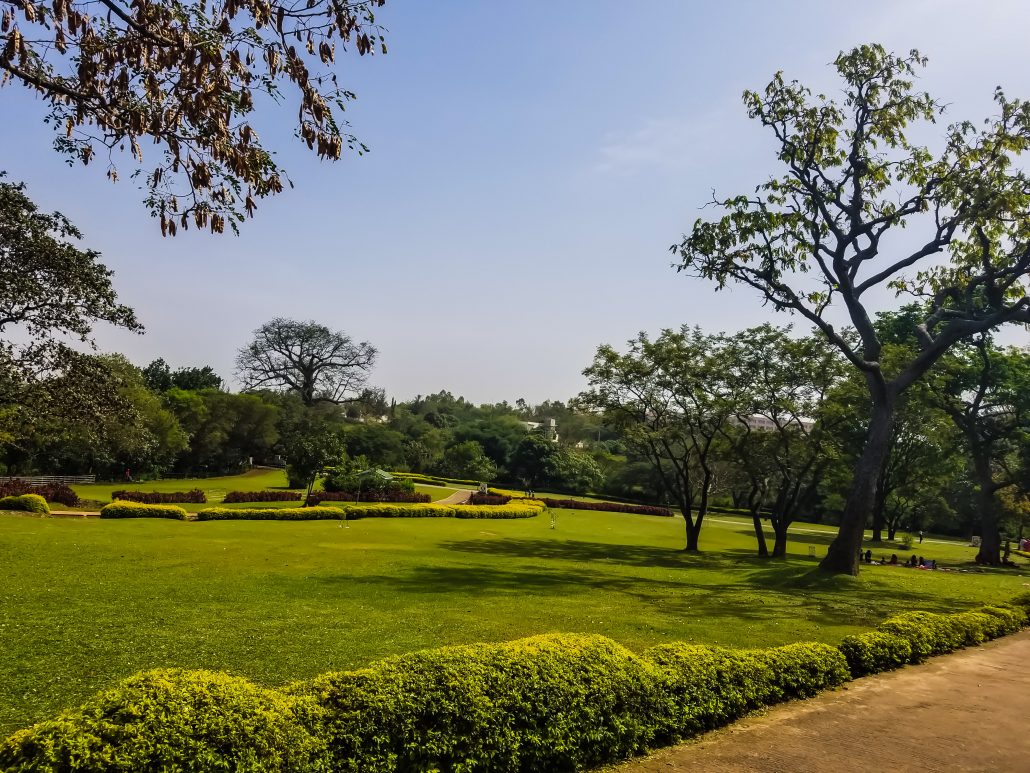
Lush fields of greens in Millenium Park Abuja
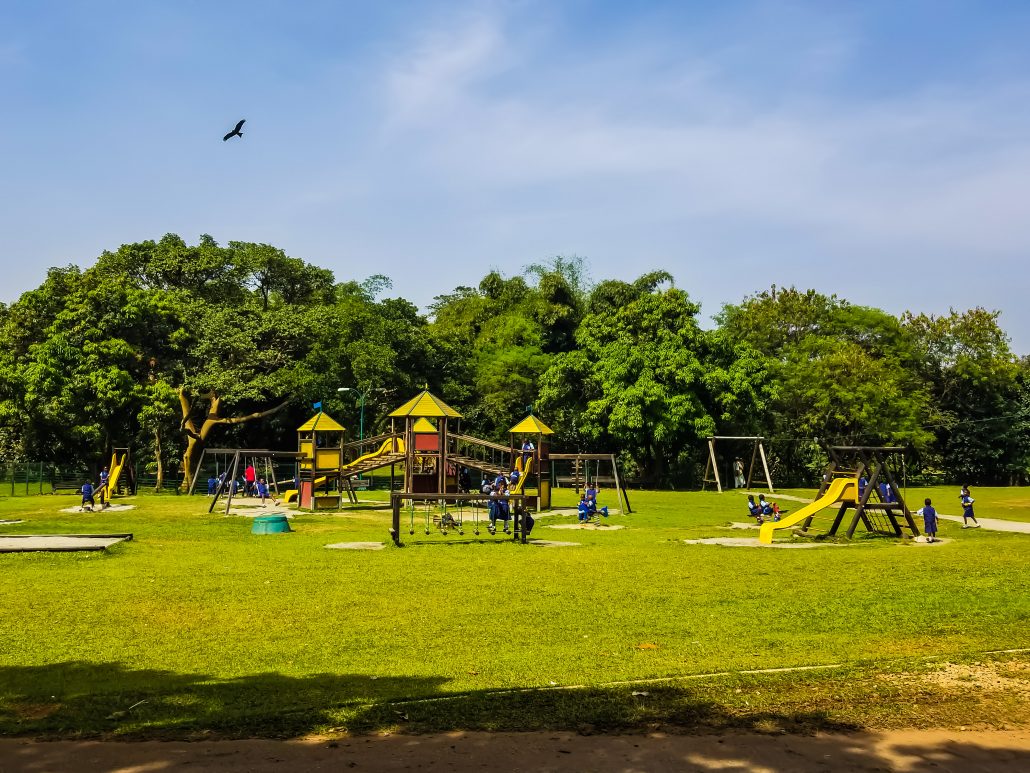
School kids playing in the playgrounds of Millenium Park Abuja
4. Abuja Arts and Crafts Village: Set in Abuja’s central business district, the Arts and Crafts Village is a collection of thatched-roofed huts with round red-brick walls where a variety of handicrafts including wooden and bronze sculptures, hand-beaded necklaces and bracelets, traditional masks, leather bags, tie-dye fabrics and clothes, etc are sold. You will support local artisans by purchasing from Abuja Arts and Crafts Village. 1161 Sani Abacha Way, Wuse, Abuja, Nigeria.
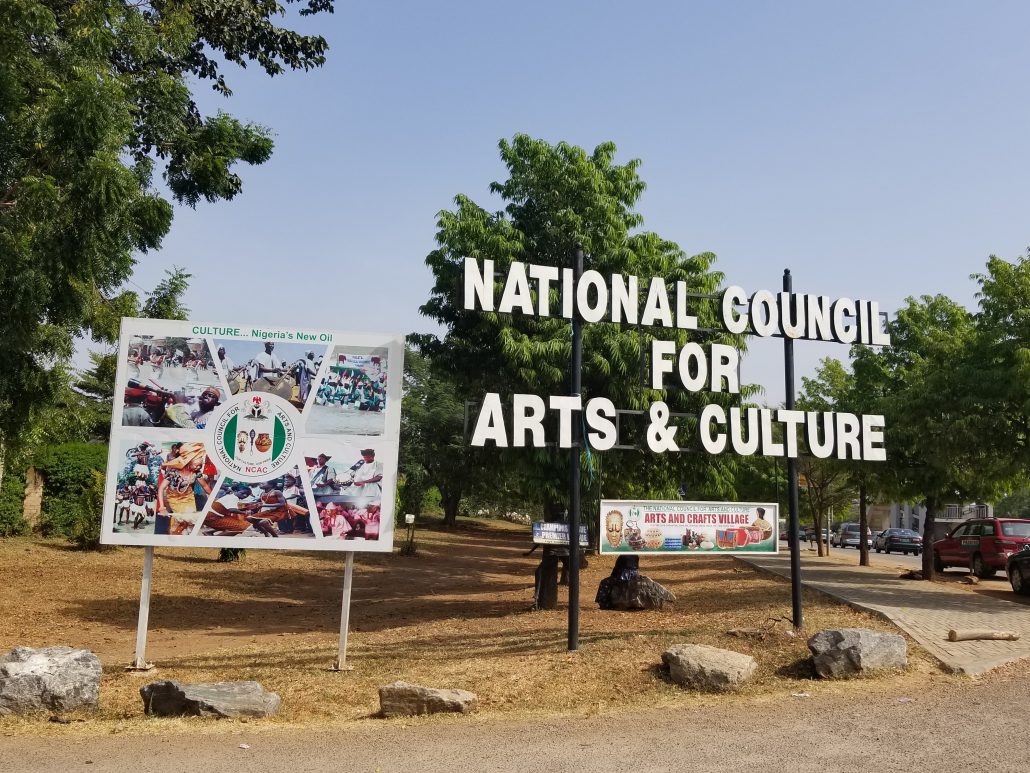
Just outside the gate of the Abuja Arts and Crafts Village

Entrance to Abuja Arts and Crafts Village
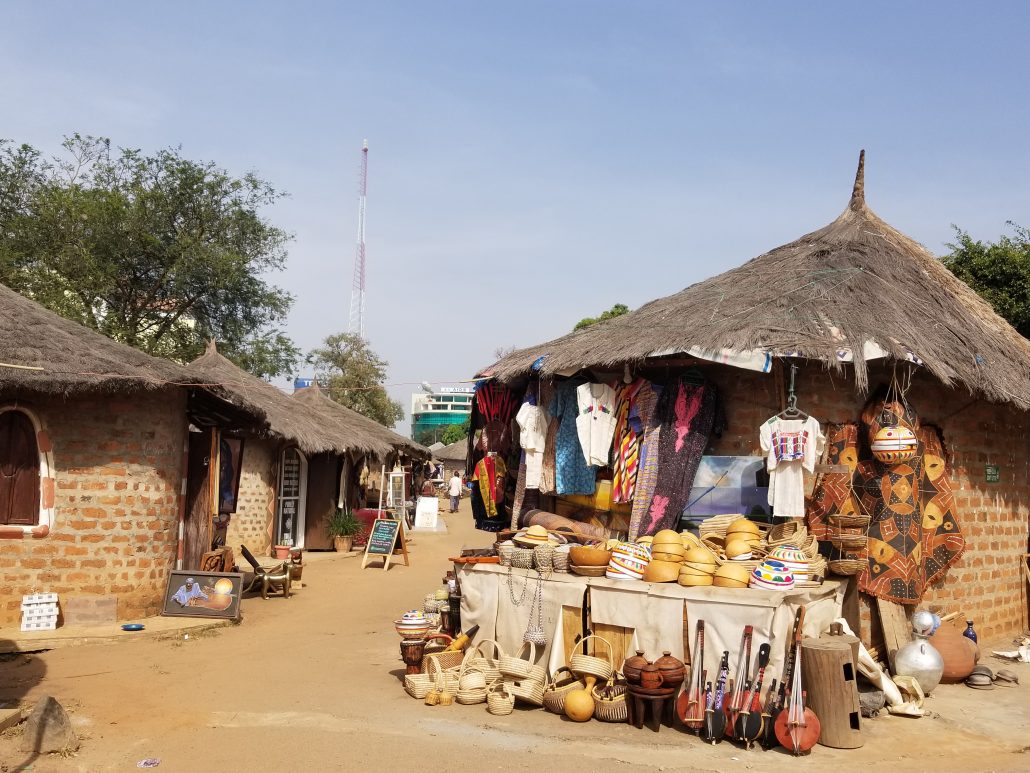
Abuja Arts and Crafts Village
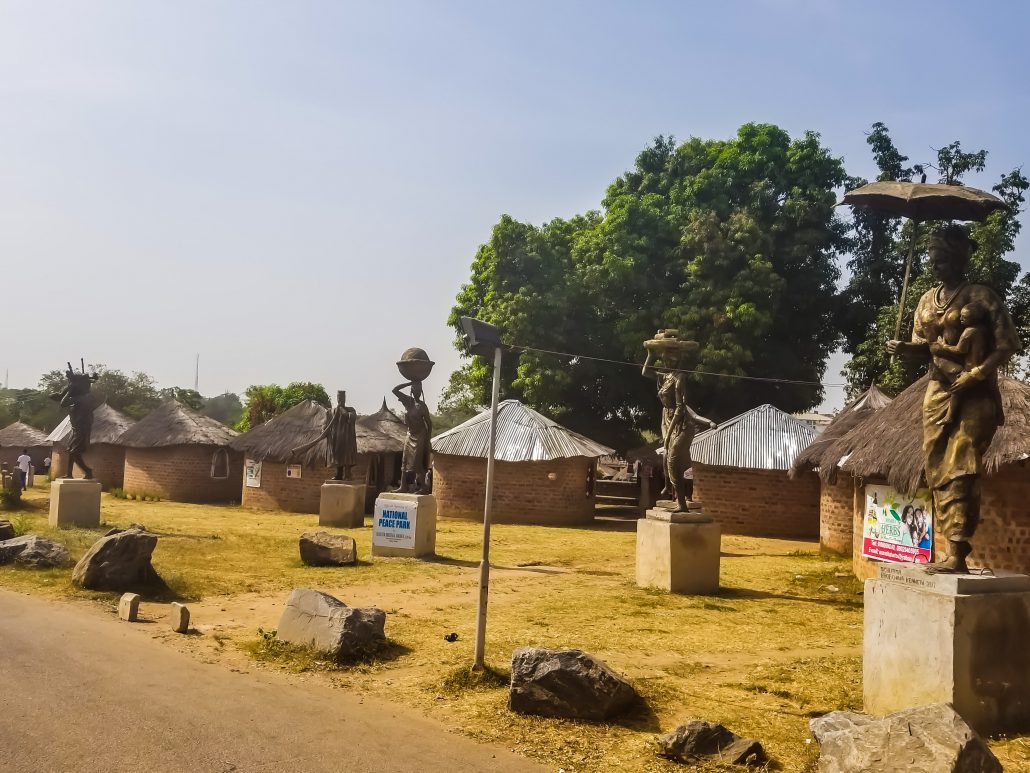
National Peace Park in the Abuja Arts and Crafts Village: A collection of Bronze Statues of people of the different Nigerian Tribes
5. Transcorp Hilton Art Exhibit: Apart from being the premier luxury hotel of Abuja, Transcorp Hilton is an important site for art exhibition in Abuja. The exhibit at Transcorp Hilton features various mediums of art from many of Abuja’s local artists–these works of art are for display and for sale. The breathtaking display of such magnificent Nigerian talent will leave you hopeful for the nation. 1 Aguiyi Ironsi St, Wuse, Abuja, Nigeria
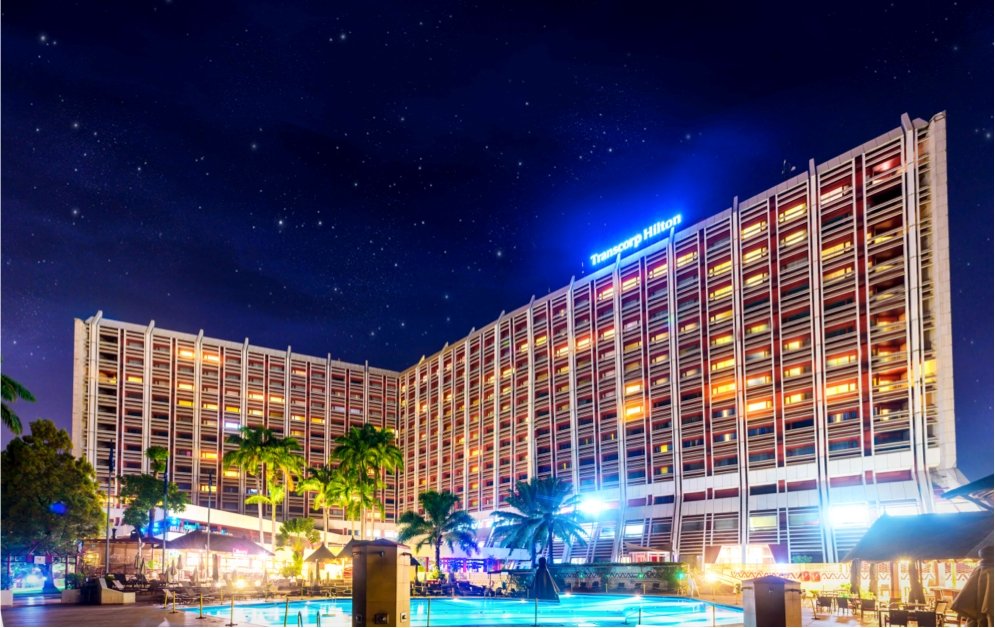
Transcorp Hilton Abuja
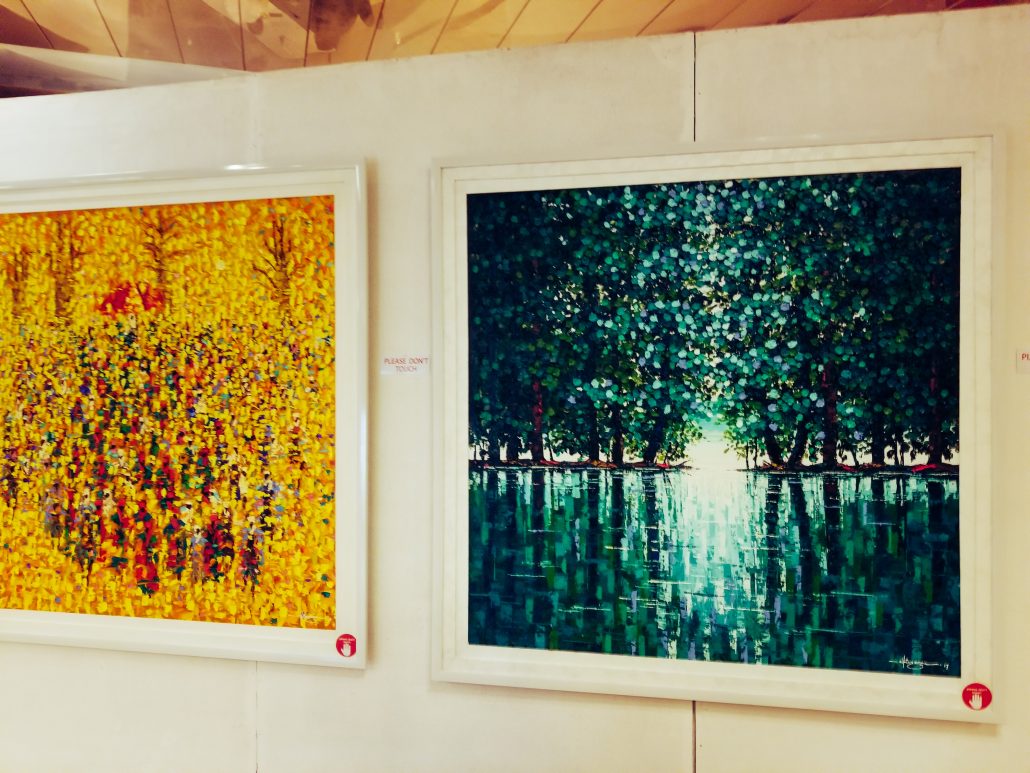
Beautiful Paintings in the Transcorp Hilton Art Exhibition Hall
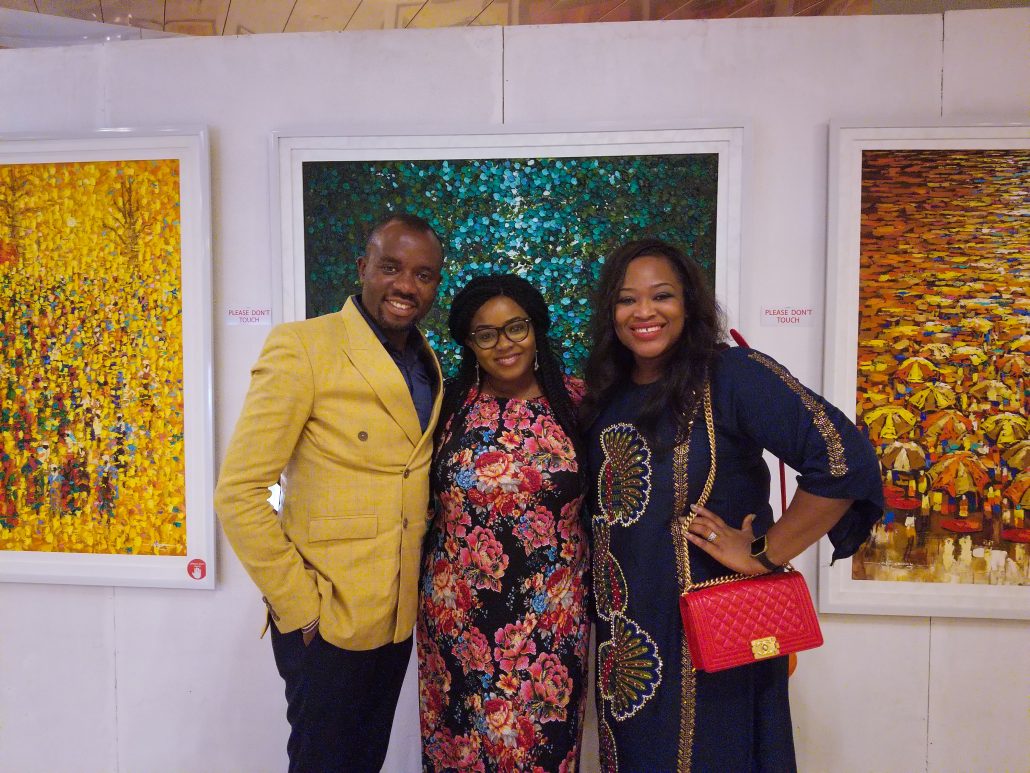
With my good friends, Ebuka and Jane, at the Transcorp Hilton Abuja Exhibition Hall
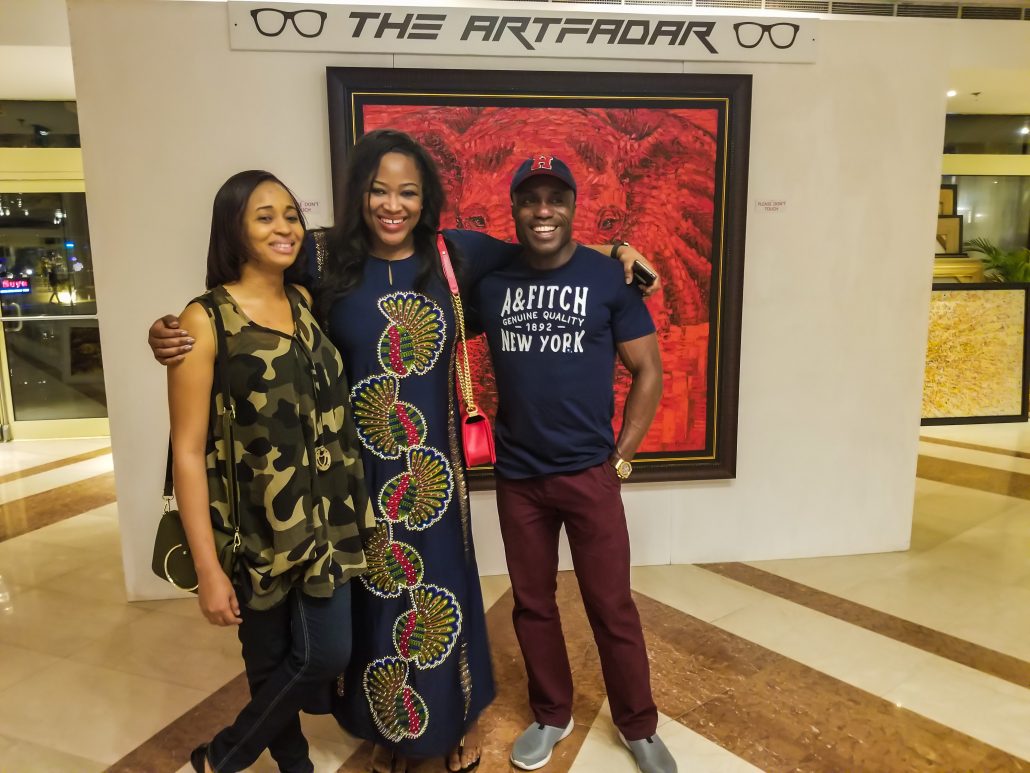
With my childhood friend, Nonye, and her wonderful hubby, Lawrence, at Transcorp Hilton art exhibit
6. Abuja Food: The Northerners are known for Cattle Herding and Halal Meat–two of foods Abuja is very known for are Suya and Kilishi.
Suya: Suya is a spicy barbecued skewered meat (like a shisk kebab). It is the tastiest form of beef you will ever consume in your life–mark my words (LOL). According to Wikipedia, Suya is traditionally prepared by the Hausa people of northern Nigeria, Cameroon, Niger, Ghana and some parts of Sudan (where it is called agashe). Suya is usually made from beef but also ram and chicken and there is a specific blend of dried peppers and spices that form Suya Pepper. If you ever visit Nigeria, Suya is a must.
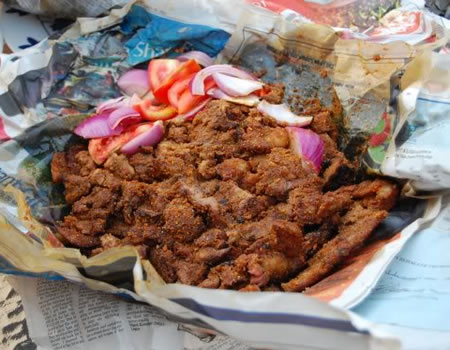
Suya (Photo Credit: Tribune Online)
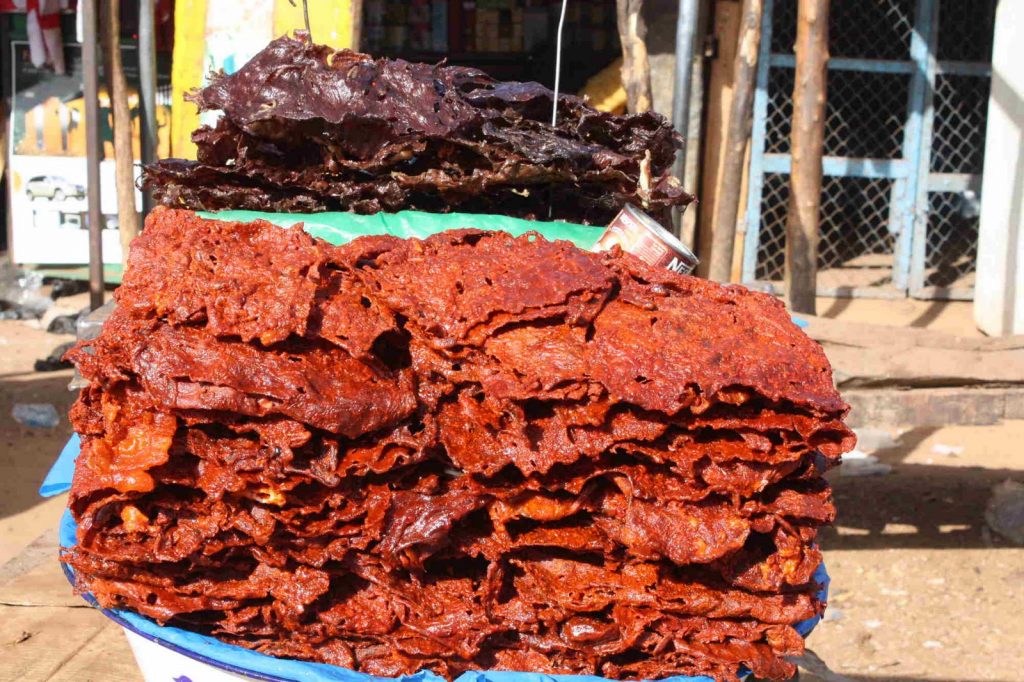
Kilishi
Kilishi: Kilishi is the West African version of meat jerky that originated in Northern Nigeria. It is a dried form of suya, made from deboned cow, sheep or goat meat. Each of the selected muscles is sliced into sheets of one metre or less for easy drying. A paste made from peanuts, called labu, is diluted with enough water, spices, salt, ground onions, and sometimes sweeteners such as honey, to add sweetness. The dried “sheets” of meat are then immersed one by one in the labu paste to coat them, before being left to dry for hours and then roasting on a wire mesh. Kilishi is so tasty and it is actually a great source of protein.
Masa: Masa is a pan-fried Rice Cake from the North of Nigeria that is so tasty on its own but is usually eaten with suya, stews, and even hummus.

Masa
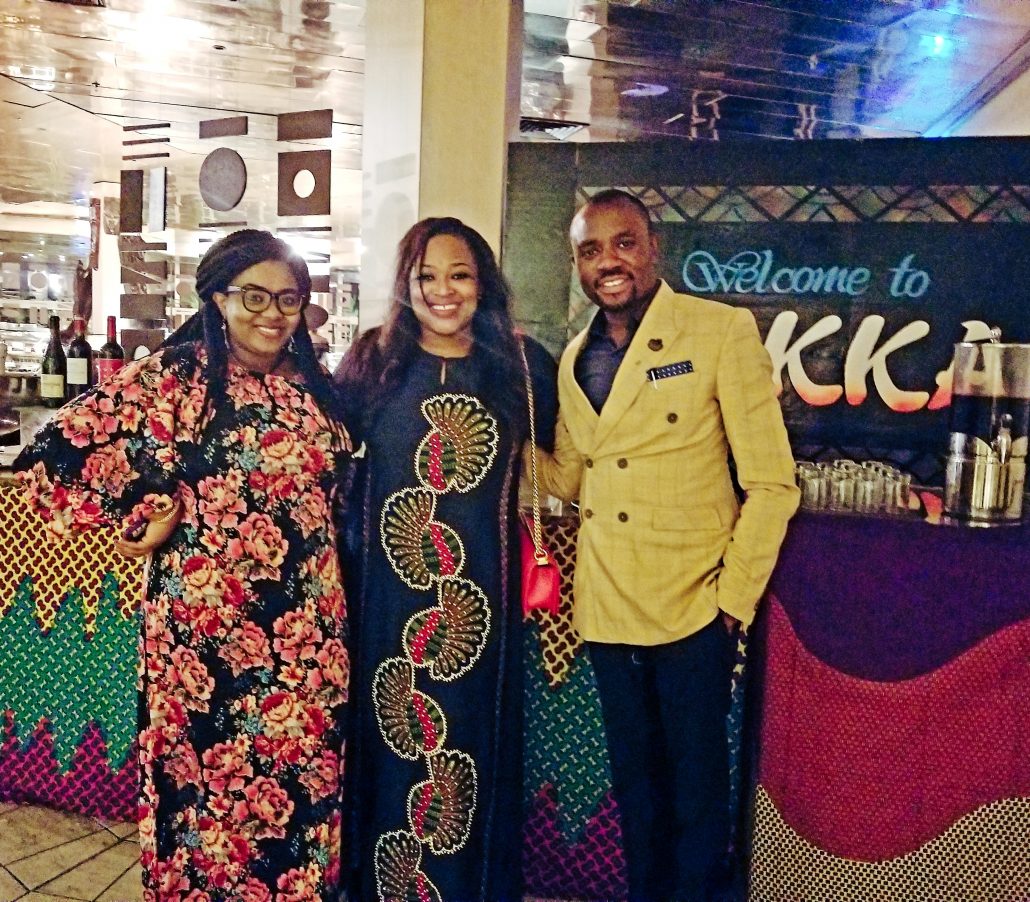
With Jane and Ebuka after dinner at Bukka in Transcorp Hilton
Honorable Mention: I also had dinner at Bukka Restaurant in Transcorp Hilton. This is a luxurious Buffet that offers dishes from all over Nigeria and all over the world. The dessert spread is just so mouth-watering. The fruits and veggies are so fresh and tasty–to me, the Bukka experience was worth every Naira (and it is a lot of Nairas).
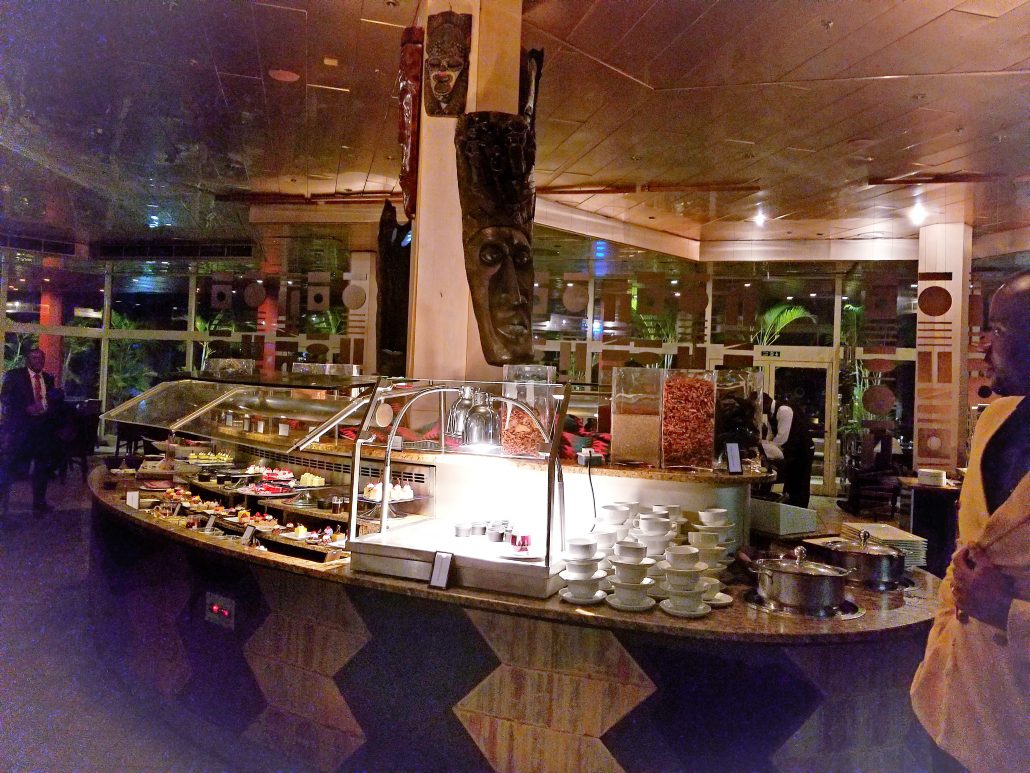
The desserts at Bukka Restaurant in Transcorp Hilton Abuja
7. Abuja Children’s Park and Zoo: The National Children’s Park and Zoo is a popular day trip, where you can introduce your children to different animals and birds. There are wild animals like Cheetahs, Giraffes, Zebras, Ostriches, Lions and a Wildebeest, as well as domestic animals like camels, donkeys and chickens. The park is in the north-eastern corner of Abuja city–it is actually located at the base of Aso Rock in Abuja near the Murtala Muhammed Expressway North.

Abuja Children’s Park and Zoo
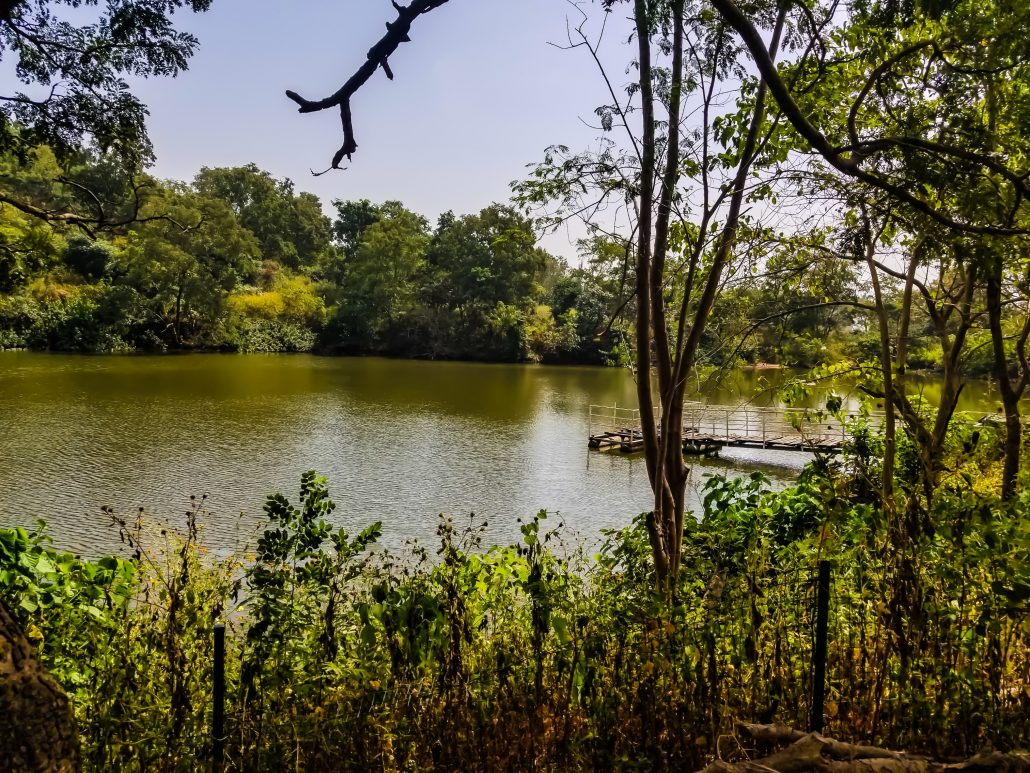
A Pond at the base of Aso Rock in the Abuja Children’s Park and Zoo
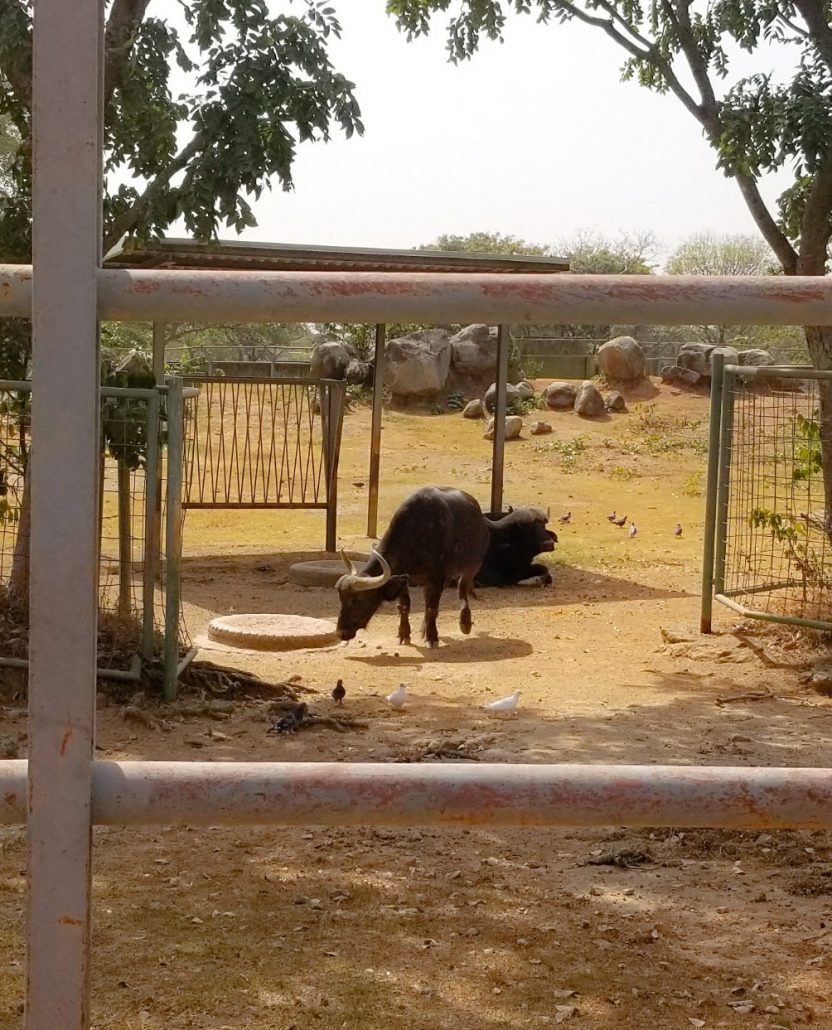
The African Buffalo at the Abuja Children’s Park and Zoo
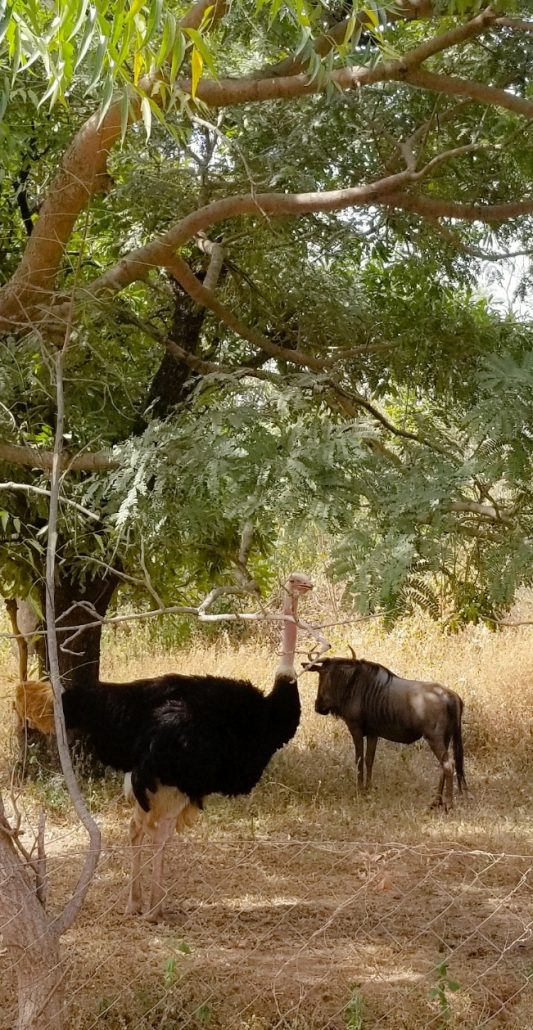
An unlikely pair: an Ostrich and a Wildebeest at the Abuja Children’s Park and Zoo
8. Abuja National Mosque: Also known as the Nigerian National Mosque, is the national mosque of Nigeria–Nigeria is about 48% Muslim, 48% Christian and 4% indigenous religions or unaffiliated. The mosque was built in 1984 and is open to the non-Muslim public, except during congregational prayers. This edifice is just such a beauty.

Abuja National Mosque
9. Shopping: Abuja has many open markets, boutique shops and shopping malls–you will be spoiled for choice. One mall that I particularly enjoyed is the Jabi Lake Mall. Located on the scenic eastern shore of Jabi Lake, a natural body of water in the Jabi district of Abuja, the mall is only a ten-minute drive west of Abuja’s business centre. You will find stores like Mango, TM Lewin, and Novesa London, but I must highlight Grey Velvet (my favourite boutique in Nigeria) and Luchiees Creations for showstopping one-of-a-kind creations made from ankara, and other fabrics like rich silks, satin and chiffon. There are many eateries, restaurants and a large movie theater at this mall–totally a one-stop entertainment and shopping destination.


Jabi Lake outside of the Jabi Lake Mall

Inside Jabi Lake Mall

My favourite Nigerian boutique: Grey Velvet (this Abuja store is in Jabi Lake Mall)
10. Abuja as compared to Lagos: Abuja is cleaner, less congested, better planned and much less stressful than Lagos. You can get anywhere you want to go to in Abuja in 10-15 minutes or less…it was such a breath of fresh air. While I grew up in Lagos and still have a fierce allegiance to the centre of excellence, I have to call a spade a spade and give Abuja major props in this matter because Lagos traffic is literally hell on earth.

Aerial View of Abuja (Photo Credit: TravelTribe.NG)
So what do you think about my trip to Abuja? Please share your thoughts and any recommendations you may have in the comment section below as I will probably be going back to Abuja again in the near future.
Love,
Chichi







Leave a Reply
Want to join the discussion?Feel free to contribute!